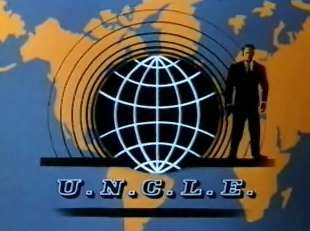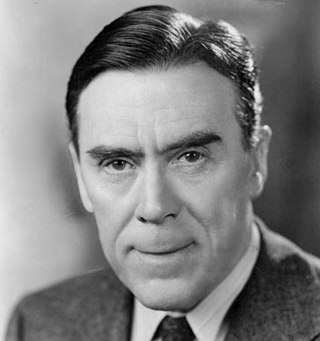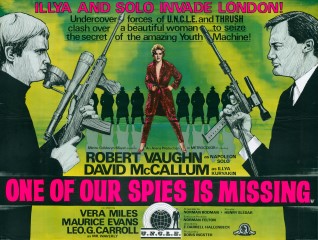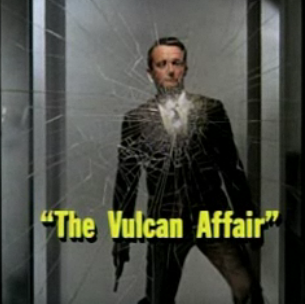
The Man from U.N.C.L.E. is an American spy fiction television series produced by Metro-Goldwyn-Mayer Television and first broadcast on NBC. The series follows secret agents Napoleon Solo, played by Robert Vaughn, and Illya Kuryakin, played by David McCallum, who work for a secret international counterespionage and law-enforcement agency called U.N.C.L.E.. The series premiered on September 22, 1964, and completed its run on January 15, 1968. The program was part of the spy-fiction craze on television, and by 1966 there were nearly a dozen imitators. Several episodes were successfully released to theaters as B movies or double features. There was also a spin-off series, The Girl from U.N.C.L.E., a series of novels and comic books, and merchandising.

Leo Grattan Carroll was an English actor. In a career of more than 40 years, he appeared in six Hitchcock films including Spellbound, Strangers on a Train and North by Northwest and in three television series, Topper, Going My Way, and The Man from U.N.C.L.E.

David Keith McCallum was a Scottish actor and musician, based in the United States. He gained wide recognition in the 1960s for playing secret agent Illya Kuryakin in the television series The Man from U.N.C.L.E (1964–1968). His other notable television roles include Simon Carter in Colditz (1972–1974) and Steel in Sapphire & Steel (1979–1982). Beginning in 2003, McCallum gained renewed international popularity for his role as NCIS chief medical examiner Dr. Donald "Ducky" Mallard in the American CBS television series NCIS, which he played for 20 seasons until his death in 2023. In film roles, McCallum notably appeared in The Great Escape (1963), and as Judas Iscariot in The Greatest Story Ever Told (1965).
U.N.C.L.E. is an acronym for the fictional United Network Command for Law and Enforcement, a secret international intelligence agency from the 1960s American television series The Man from U.N.C.L.E. and The Girl from U.N.C.L.E. The stars of the original series were Robert Vaughn, David McCallum, and Leo G. Carroll . The series included 105 episodes from 1964 to its cancellation in 1968. In 2015, a movie adaptation of the same name was released.

The Girl from U.N.C.L.E. is an American spy fiction TV series starring Stefanie Powers that aired on NBC for one season from September 13, 1966, to April 11, 1967. The series was a spin-off from The Man from U.N.C.L.E. and used the same theme music composed by Jerry Goldsmith, in a different arrangement by Dave Grusin. The Girl from U.N.C.L.E. stars Powers as American U.N.C.L.E. agent April Dancer and Noel Harrison as her British partner, Mark Slate. Leo G. Carroll plays their superior, Alexander Waverly.

Napoleon Solo is a fictional character from the 1960s TV spy series The Man from U.N.C.L.E. The series format was notable for pairing the American Solo, played by Robert Vaughn, and the Russian Illya Kuryakin, played by David McCallum, as two spies who work together for an international espionage organisation at the height of the Cold War.

Illya Kuryakin is a fictional character from the 1960s TV spy series, The Man from U.N.C.L.E. He is a secret agent with a range of weapons and explosives skills, and is described in the series as holding a master's degree from the Sorbonne and a Ph.D. in Quantum Mechanics from the University of Cambridge. And attended the University of Georgia in Ukraine, where he studied gymnastics among other things. Kuryakin speaks many languages, including French, Spanish, German, Arabic, Italian and Japanese. The series was remarkable for pairing an American character, Napoleon Solo, with the Russian Kuryakin as two spies who work together for an international espionage organization at the height of the Cold War.

How to Steal the World is a 1968 American action–adventure film, taken from a two-part episode of the TV series The Man from U.N.C.L.E., with Robert Vaughn and David McCallum as secret agents Napoleon Solo and Illya Kuryakin. The film also stars Barry Sullivan, Eleanor Parker, Leslie Nielsen, Tony Bill, Peter Mark Richman, Albert Paulsen, Inger Stratton, Hugh Marlowe, and Dan O'Herlihy. It was originally telecast as the final episode of the series, "The Seven Wonders of the World Affair". The feature version is the only U.N.C.L.E. film not to include Jerry Goldsmith's theme music. The film was directed by Sutton Roley and written by Norman Hudis.

Please Don't Eat the Daisies is an American sitcom that aired on NBC from September 14, 1965, to September 2, 1967. The series is based on the 1957 book by Jean Kerr and the 1960 film starring Doris Day and David Niven.

The Helicopter Spies is a 1968 feature-length film version of The Man from U.N.C.L.E.'s fourth season two-part episode "The Prince of Darkness Affair". The episodes were originally broadcast in the United States on October 2, 1967, and October 9, 1967, on NBC. Like the television series, it stars Robert Vaughn and David McCallum. It is the seventh such feature film that used as its basis a reedited version of one or more episodes from the series. The film was directed by Boris Sagal and written by Dean Hargrove. Carol Lynley, Bradford Dillman, Lola Albright, John Dehner, Julie London, H.M. Wynant, and Roy Jenson also star in the film.

The Karate Killers is a 1967 American spy film and feature-length film version of The Man from U.N.C.L.E.'s third season two-part episode "The Five Daughters Affair". The episodes were originally broadcast in the United States on March 31, 1967, and April 7, 1967, on NBC. It, as does the television series, stars Robert Vaughn and David McCallum. It is the sixth such feature film that used as its basis a reedited version of one or more episodes from the series. Joan Crawford, Telly Savalas, Herbert Lom, Diane McBain, Jill Ireland, and Kim Darby are among those in the cast. The film was directed by Barry Shear and written by Norman Hudis with the story by Boris Ingster.

The Spy with My Face is a 1965 spy-fi spy film based on The Man from U.N.C.L.E. television series. Robert Vaughn and David McCallum reprised their roles as secret agents Napoleon Solo and Illya Kuryakin respectively. THRUSH tries to steal a super weapon by substituting a double for Solo. The film was directed by John Newland.

The Spy in the Green Hat is a 1967 feature-length film version of The Man from U.N.C.L.E.'s third season two-part episode "The Concrete Overcoat Affair". The episodes were originally broadcast in the United States on November 25, 1966 and December 2, 1966 on NBC. The film was directed by Joseph Sargent and written by Peter Allan Fields with the story by David Victor. Robert Vaughn and David McCallum star in the film as they do in the television series. It is the fifth such feature film that used as its basis a reedited version of one or more episodes from the series.

One Spy Too Many, starring Robert Vaughn and David McCallum, is the 1966 feature-length film version of The Man from U.N.C.L.E.'s two-part season two premiere "Alexander the Greater Affair". It is the third such feature film that used as its basis a reedited version of one or more episodes from the series. In this instance, the film took the two-part episode and added in a subplot featuring Yvonne Craig as an U.N.C.L.E. operative carrying on a flirtatious relationship with Napoleon Solo ; Craig does not appear in the television episodes. Both episodes were written by Dean Hargrove and directed by Joseph Sargent.

To Trap a Spy is the feature-length film version of the 70-minute television pilot of The Man from U.N.C.L.E. starring Robert Vaughn. It also features Patricia Crowley, William Marshall, Fritz Weaver, and David McCallum. The film was directed by Don Medford.

The Return of the Man from U.N.C.L.E.: The Fifteen Years Later Affair is a 1983 American made-for-television action-adventure film based on the 1964–1968 television series The Man from U.N.C.L.E. starring Robert Vaughn and David McCallum reprising the roles they had originated on that program. Several of the crew from the series also worked on the film, which was produced by Viacom rather than Metro-Goldwyn-Mayer and/or Turner Entertainment. Leo G. Carroll had died in 1972, so Patrick Macnee was recruited to appear as an entirely different character, Sir John Raleigh, who had presumably taken over as Number 1 of Section I, the Director of U.N.C.L.E., after Alexander Waverly had died, and Carroll's photograph was displayed prominently in many scenes that featured Macnee's Sir John.

One of Our Spies Is Missing is the 1966 feature-length film version of The Man from U.N.C.L.E.'s second season two-part episode "The Bridge of Lions Affair". The episodes were originally broadcast in the United States on February 4, 1966 and February 11, 1966 on NBC. The film is directed by E. Darrell Hallenbeck and written by Howard Rodman. It, as does the television series, stars Robert Vaughn and David McCallum. It is the fourth such feature film that used as its basis a reedited version of one or more episodes from the series. However, this film, and the episodes it draws from, represents the only instance where a Man from U.N.C.L.E. story is derived from an existing novel: The Bridge of Lions (1963) by Henry Slesar.
The Man from U.N.C.L.E. gun often referred to as the U.N.C.L.E. Special is a fictional firearm depicted on the popular TV show The Man from U.N.C.L.E. which ran from September 1964 until it was canceled mid-season in 1968. Onscreen it was semi-automatic pistol that could be converted to a carbine-sniper rifle that could fire full automatic.

"The Vulcan Affair" is the first episode of the television series The Man from U.N.C.L.E. It was edited from the pilot, "Solo", which was shot in colour, but was broadcast in black-and-white, to conform with the rest of the first season. It was first broadcast in the United States on NBC on September 22, 1964. The hero is Napoleon Solo and his antagonist is Andrew Vulcan, an evil scientist working with THRUSH. The episode was subsequently expanded with additional footage and released in colour as the feature-length movie, To Trap a Spy.

The Man from U.N.C.L.E. is a 2015 spy film directed by Guy Ritchie and written by Ritchie and Lionel Wigram. It is based on the 1964 MGM television series of the same name, which was created by Norman Felton and Sam Rolfe. The film stars Henry Cavill, Armie Hammer, Alicia Vikander, Elizabeth Debicki, and Hugh Grant. The film was produced by RatPac-Dune Entertainment and Davis Entertainment while Turner Entertainment Co., the original TV series current holder, was also involved.














